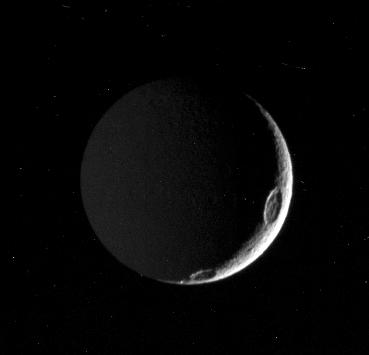Tethys in the Dark

| PIA Number | PIA07577 |
|---|---|
| Language |
|
A close inspection of this image reveals that there is more of Saturn's moon Tethys here than is apparent at first glance. A slim crescent is all that is visible of the moon's sunlit side, but the left half of the image is dimly lit by "Saturnshine," or reflected light from the planet lying off to the left of Cassini's field of view. Tethys is 1,071 kilometers (665 miles) across.
On occasion, useful details about a moon's surface characteristics can be revealed under such dim illumination, as in Iapetus by Saturn Shine.
This view shows principally the Saturn-facing hemisphere of Tethys; north is up. Craters along the terminator, the boundary between day and night, are Penelope (at the top) and Antinous (at the bottom).
The image was taken with the Cassini spacecraft narrow-angle camera on Aug. 3, 2005. The spacecraft was approximately 842,000 kilometers (523,000 miles) from Tethys. The image was taken with a filter sensitive to wavelengths of polarized ultraviolet light centered at 338 nanometers from Tethys and at a Sun-Tethys-spacecraft, or phase, angle of 144 degrees. Image scale is 5 kilometers (3 miles) per pixel.
The Cassini-Huygens mission is a cooperative project of NASA, the European Space Agency and the Italian Space Agency. The Jet Propulsion Laboratory, a division of the California Institute of Technology in Pasadena, manages the mission for NASA's Science Mission Directorate, Washington, D.C. The Cassini orbiter and its two onboard cameras were designed, developed and assembled at JPL. The imaging operations center is based at the Space Science Institute in Boulder, Colo.
For more information about the Cassini-Huygens mission visit http://saturn.jpl.nasa.gov . The Cassini imaging team homepage is at http://ciclops.org .
Credit: NASA/JPL/Space Science Institute
